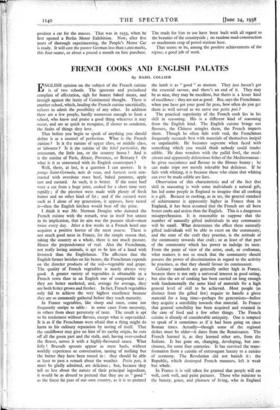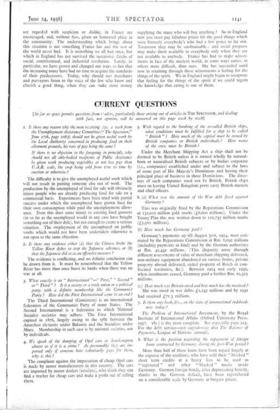FRENCH COOKS AND ENGLISH PALATES
By BASIL COLLIER
ENGLISH opinion on the subject of the French cuisine is of two schools. The ignorant and prejudiced complain of affectation, sigh for honest baked meats, and inveigh against the laxity of Continental thought. There is another school, which, lauding the French cuisine uncritically, refuses to admit the possibility of any other. In addition there are a few people, hardly numerous enough to form a school, who know and praise a good thing wherever it may occur, and are as quick to recognise, if slower to condemn, the faults of things they love.
That before you begin to speak of anything you should define it as a counsel of perfection. What is the French cuisine ? Is it tte cuisine of upper class, or middle class, or labourer ? Is it the cuisine of the hotel particulier, the restaurant, the little inn, or the country house ? And is it the cuisine of Paris, AlsaCe, Provence, or Brittany ? Or what is it as contrasted with its English counterpart ?
Well, there, at last, is a question I can answer. It is potage Saint-Germain, noix de veau, and haricots verts con- trasted with overdone roast beef, baked potatoes, apple tart and custard. As such, it is better. If the roast beef were a cut from a huge joint, cooked for a short time very rapidly ; if the piecrust were made with plenty of fresh butter and no other kind of fat ; and if the custard were such as I alone of my generation, it appears, have tasted it—then the English kitchen would bear off the prize.
I think it was Mr. Norman Douglas who damned the French cuisine with the remark, true in itself but unjust in its implication, that its aim was the peasant ideal—meat twice every day. After a few weeks in a French hotel one acquires a positive horror of the meat course. There is not much good meat in France, for the simple reason that, taking the country as a whole, there is not much pasture. Hence the preponderance of veal. Also the Frenchman, not really loving animals, is apt to be less of a hand with livestock than the Englishman. The affection that the English farmer lavishes on his beasts, the Frenchman expends on the directer products of the soil—vegetable and grape. The quality of French vegetables is nearly always very good. A greater variety of vegetables is obtainable in a French town than in an English one of comparable size ; they are better marketed, and, average for average, they are both better grown and fresher. In fact, French vegetables only fail to achieve the very highest excellence because they are so commonly gathered before they reach maturity.
In France vegetables, like sheep and oxen, come too frequently unripe to table : in some cases from necessity, in others from sheer perversity of taste. The result is apt to be tenderness without flavour, except what is superadded. It is as if the Frenchman were afraid that a thing might do harm to his culinary reputation by tasting of itself: That the cauliflower may give no hint of its earthy origin, he cuts off all the green part and the stalk, and, having over-cooked the flower, serves it with a highly-flavoured sauce. What folly ! Brussels sprouts appear as mere buds, without worldly experience or conversation, tasting of nothing but the butter they have been tossed in : they should be able at least to pass a remark about the weather. Petits pois, it must be gladly admitted, are delicious ; but, because they tell us less about the nature of their principal ingredient, it would be as absurd to pretend that they are as " good " as the finest Eat peas of our. own country, as it is to pretend the lamb is as " good " as mutton. They just haven't got the essential savour, and there's an end of it. They may be as nice, they may be excellent, but theirs is a lesser kind of excellence : they are not as good. But, says the Frenchman; when you have got your good fat peas, how often do you get them as well served as we serve our petits pois?
The practical superiority of the French cook lies" in his skill in seasoning. His is a different kind of seasoning from the English kind. The English cuisine brings out flavours, the Chinese mingles them,' the French imparts them. Though he often fails with veal, the Frenchman frequently succeeds best with materials of theinselves insipid or unpalatable. He becomes supreme when faced with something which you would think nobody could render edible. " He does wonders with the pallid fowl, the recal- citrant and apparently deleterious fishes of the Mediterranean : he gives succulence and flavour to the fibrous bunny ; he can make tripe not merely tolerable but delicious. If he fails with whiting, it is because those who claim that whiting can ever be made edible are liars.
Observation of this characteristic and of the fact that skill in seasoning is with some individuals a natural gift, has led some people in England to imagine that all cooking is a gift. Because in cooking, as in art, the general standard of achievement is apparently higher in France than in England, it has been assumed that the French are all born better cooks and artists than the English. This is a dangerous misapprehension. It is reasonable to suppose that the number of naturally gifted individuals in any community will be small.. What determines the effect these naturally gifted individuals will be able to exert on the community, and the state of the craft they practise, is the attitude of the community towards that craft ; or at least of that part of the community which has power to indulge its taste. From the point of view of the artist, cook, or craftsman, what matters is not so much that the community should possess the power of discrimination in regard to the activity he practises, as that they should favour its continuance.
Culinary standards are generally rather high in France, because there is not only a universal interest in good eating, but also the art of cooking has been carried on long enough with fundamentally the same kind of materials for a high general level of skill to be achieved. Most people (as distinct from the gifted few) require to handle a given material for a long time—perhaps for generations—before they acquire a sensibility towards that material. In France that general sensibility has been acquired and retained in the case of food and a few other things. The French cuisine is already of considerable antiquity. One is tempted to speak of it sometimes as if it had been going on since Roman times. Actually—though some of the regional dishes must be older—it dates from the Renaissance. The French learned it, as they learned other arts, from the Italians. It has gone on, changing, developing, but con- tinuous, for some four centuries. It has survived the trans- formation from a cuisine of extravagant luxury to a cuisine of economy. The Revolution did not banish it : the Republic, which destroyed French manners, left , it weak but whole.
In France it is still taken for granted that people will eat well, cook well, and paint pictures. Those who minister to the beauty, grace, and pleasure of living, who in England are regarded with suspicion or dislike, in France are encouraged, and, without fuss, given an honoured place in the community. The understanding which brings about this situation is not something France has and the rest of the world never had. It is something we all had once, but which in England has not survived the successive. shocks of social, constitutional, and industrial revolution. Lately, in particular, we have grown and changed our ways so fast that the increasing many have had no time to acquire the standards of their predecessors. Today, why should our merchants and purveyors listen to the voice of the few who know and cherish a good thing, when they can make more money supplying the many who will buy anything ? So in England now you must pay fabulous prices for the good things which were formerly everybody's who had a few pence to lay out. Tomorrow they may be unobtainable ; and social progress may make them available to everybody only when they are not available to anybody. France has had to make adjust- ments in face of the modern world, in some ways easier, in others more difficult, than ours. She has succeeded until now in retaining through these adjustments a feeling for the things of the spirit. We in England might begin to recapture that feeling for the things of the spirit if we could regain the knowledge that eating is one of them.















































 Previous page
Previous page